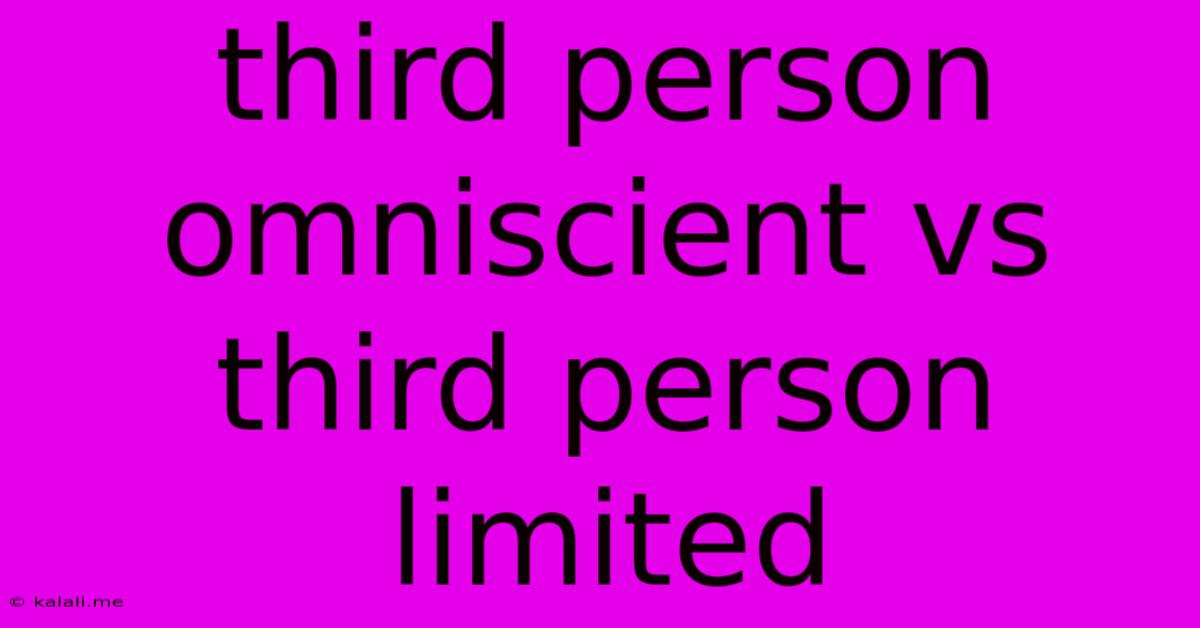Third Person Omniscient Vs Third Person Limited
Kalali
Jun 04, 2025 · 3 min read

Table of Contents
Third Person Omniscient vs. Third Person Limited: A Writer's Guide to Narrative Perspective
Choosing the right narrative perspective can significantly impact the reader's experience and the overall success of your story. Two popular choices are third-person omniscient and third-person limited. Understanding the nuances of each is crucial for crafting a compelling and effective narrative. This article will delve into the key differences, advantages, and disadvantages of each, helping you make an informed decision for your next writing project.
What is Third Person Narration?
Before diving into the specifics, let's establish a baseline understanding. Third-person narration uses pronouns like "he," "she," "it," and "they" to refer to characters. The narrator is not a character within the story itself. However, the scope of the narrator's knowledge distinguishes the different types of third-person perspectives.
Third Person Omniscient: The All-Knowing Narrator
In a third-person omniscient narrative, the narrator possesses complete knowledge of all characters' thoughts, feelings, and experiences. This perspective allows for a broad scope, offering insights into the internal lives of multiple characters and providing a comprehensive view of the story's events.
Advantages of Third Person Omniscient:
- Broad Scope: Provides a panoramic view of the story, revealing multiple perspectives and interconnected plotlines.
- Rich Character Development: Allows for deep exploration of multiple characters' inner worlds, building complex and multifaceted personalities.
- Control over the Narrative: The narrator can guide the reader's understanding and interpretations, highlighting specific details or themes.
Disadvantages of Third Person Omniscient:
- Potential for Distance: The all-knowing narrator can sometimes feel detached or impersonal, reducing the reader's emotional connection with individual characters.
- Overwhelming Information: Providing too much information can lead to reader fatigue and a lack of suspense.
- Maintaining Consistency: Managing multiple perspectives consistently and seamlessly can be challenging, demanding meticulous planning and execution.
Third Person Limited: A Focused Perspective
The third-person limited perspective restricts the narrator's knowledge to a single character's thoughts, feelings, and experiences. The reader sees the story unfold primarily through this character's eyes and understanding.
Advantages of Third Person Limited:
- Increased Reader Engagement: The focused perspective fosters a stronger emotional connection between the reader and the chosen character.
- Enhanced Suspense and Mystery: Limiting the reader's knowledge creates opportunities for dramatic irony and suspense, as the reader might know less than the character.
- Control over the Pace: The narrative can focus on specific details and build tension through the character's perspective.
Disadvantages of Third Person Limited:
- Limited Scope: The reader is confined to the perspective of a single character, potentially missing crucial information or alternative interpretations of events.
- Potential for Bias: The reader's understanding is shaped by the chosen character's perspective, which could be unreliable or flawed.
- Difficulty in Exploring Multiple Plotlines: Weaving multiple plotlines together can be challenging when limited to a single character's perspective.
Choosing the Right Perspective: Key Considerations
The optimal choice between third-person omniscient and third-person limited depends heavily on the story's requirements.
- Complexity of the Plot: For intricate plots involving multiple characters and storylines, omniscience might be beneficial. For simpler plots focusing on a single character's journey, limited perspective might be more effective.
- Desired Reader Experience: If you aim for a more intimate and engaging reader experience, limited perspective is often preferable. For a broader, more analytical view, omniscience might be a better fit.
- Theme and Tone: The perspective should align with the overall theme and tone of your story.
Ultimately, the best narrative perspective is the one that best serves your story. Consider experimenting with both to determine which one best captures the essence of your narrative voice and enhances the reader's overall experience. Carefully weigh the advantages and disadvantages before making your choice. Remember that the power of your storytelling lies in effectively conveying your narrative through the lens you select.
Latest Posts
Latest Posts
-
Meaning Of Does The Carpet Match The Drapes
Jun 05, 2025
-
How To Underline Text Just With Unicode
Jun 05, 2025
-
How To Insert Hyperlink In Facebook Post
Jun 05, 2025
-
How To Keep Chipmunks Out Of Garden
Jun 05, 2025
-
Unable To Acquire The Dpkg Frontend Lock
Jun 05, 2025
Related Post
Thank you for visiting our website which covers about Third Person Omniscient Vs Third Person Limited . We hope the information provided has been useful to you. Feel free to contact us if you have any questions or need further assistance. See you next time and don't miss to bookmark.